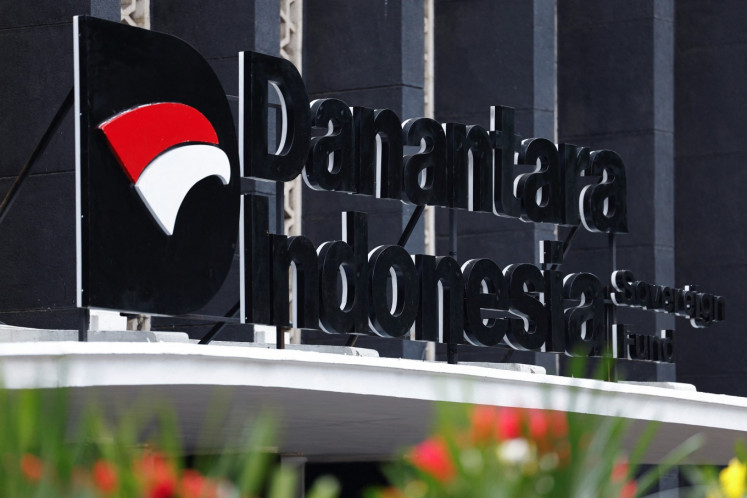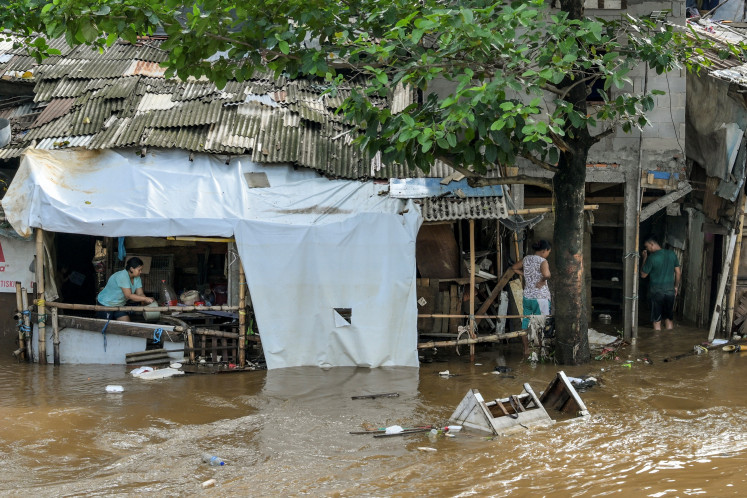Popular Reads
Top Results
Can't find what you're looking for?
View all search resultsPopular Reads
Top Results
Can't find what you're looking for?
View all search resultsPhilippine rebels reject changes in proposed autonomy law
Moro Islamic Liberation Front (MILF) peace negotiator Mohagher Iqbal and Teresita Deles, presidential adviser on the peace process, arrive for a forum with foreign correspondents based in the Philippines, on the passage of the Bangsamoro Basic Law (BBL) that would pave the way for the creation of a new autonomous political entity that would replace the Autonomous Region in Muslim Mindanao (ARMM) in southern Philippines, Friday, at suburban Mandaluyong city, east of Manila
Change text size
Gift Premium Articles
to Anyone
 q: Moro Islamic Liberation Front (MILF) peace negotiator Mohagher Iqbal and Teresita Deles, presidential adviser on the peace process, arrive for a forum with foreign correspondents based in the Philippines, on the passage of the Bangsamoro Basic Law (BBL) that would pave the way for the creation of a new autonomous political entity that would replace the Autonomous Region in Muslim Mindanao (ARMM) in southern Philippines, Friday, at suburban Mandaluyong city, east of Manila. (AP/Bullit Marquez) (MILF) peace negotiator Mohagher Iqbal and Teresita Deles, presidential adviser on the peace process, arrive for a forum with foreign correspondents based in the Philippines, on the passage of the Bangsamoro Basic Law (BBL) that would pave the way for the creation of a new autonomous political entity that would replace the Autonomous Region in Muslim Mindanao (ARMM) in southern Philippines, Friday, at suburban Mandaluyong city, east of Manila. (AP/Bullit Marquez)
q: Moro Islamic Liberation Front (MILF) peace negotiator Mohagher Iqbal and Teresita Deles, presidential adviser on the peace process, arrive for a forum with foreign correspondents based in the Philippines, on the passage of the Bangsamoro Basic Law (BBL) that would pave the way for the creation of a new autonomous political entity that would replace the Autonomous Region in Muslim Mindanao (ARMM) in southern Philippines, Friday, at suburban Mandaluyong city, east of Manila. (AP/Bullit Marquez) (MILF) peace negotiator Mohagher Iqbal and Teresita Deles, presidential adviser on the peace process, arrive for a forum with foreign correspondents based in the Philippines, on the passage of the Bangsamoro Basic Law (BBL) that would pave the way for the creation of a new autonomous political entity that would replace the Autonomous Region in Muslim Mindanao (ARMM) in southern Philippines, Friday, at suburban Mandaluyong city, east of Manila. (AP/Bullit Marquez)
M
span class="caption" style="width: 509px;">Moro Islamic Liberation Front (MILF) peace negotiator Mohagher Iqbal and Teresita Deles, presidential adviser on the peace process, arrive for a forum with foreign correspondents based in the Philippines, on the passage of the Bangsamoro Basic Law (BBL) that would pave the way for the creation of a new autonomous political entity that would replace the Autonomous Region in Muslim Mindanao (ARMM) in southern Philippines, Friday, at suburban Mandaluyong city, east of Manila. (AP/Bullit Marquez)
A Muslim rebel leader said Friday that changes that would water down a proposed Muslim autonomy law under a peace deal with the Philippine government are unacceptable and that insurgents are appealing to lawmakers to pass legislation that would help end a decades-old rebellion in the country's south.
Mohagher Iqbal, chief negotiator for the rebel Moro Islamic Liberation Front, said delays in the passage of the autonomy bill in Congress have made the insurgents anxious. He said rebel leaders are regularly notifying commanders on progress in implementing the peace deal, which was signed last year.
Under the Malaysian-brokered agreement, the rebels dropped their separatist bid in exchange for a more powerful and better-funded Muslim autonomous region to be called Bangsamoro. It was to be created with a bill drafted by a rebel-government commission and submitted to Congress.
A police anti-terror assault in January, however, spun out of control and led to the killings of 44 police commandos in clashes that entangled some of the Moro rebels. The police deaths, their largest single-day combat loss in years, sparked public outrage and prompted lawmakers to scrutinize and water down the autonomy bill, delaying its passage.
At least 77 provisions and passages have been deleted, changed or diluted by a Senate committee and at least 28 changes have been introduced in the House of Representatives. The changes would limit the new autonomous region's power and revenue share, Iqbal said. Legislators have argued that the amendments were necessary to remove potentially unconstitutional provisions that could scuttle the law if it faces a legal challenge in the Supreme Court.
"If this version of the law will be signed into law, then certainly it will put the MILF in a very, very hard situation and, of course, the decision would be not to accept the bill," Iqbal told reporters.
Asked how the rebels and their followers were reacting to delays in the peace deal, he said they were naturally frustrated but suggested there was no danger of an outbreak of violence.
"You know waiting is terrible," Iqbal said. "But we are managing that anxiety, and rest assured that the MILF leadership is in control of the situation."
Presidential adviser Teresita Deles, who oversees the peace deal with the rebels, said the delays in the bill's passage may send the wrong signal to Muslim communities, which have suffered from years of on-and-off fighting but have begun to rebuild their lives under a 2012 cease-fire that has halted clashes.
"We risk telling them that their dreams, their aspirations have no place here," Deles said. "We risk telling them that we simply don't care if they have to once again return to the hellish suffering of war."
The proposed changes to the autonomy bill could still be eased in upcoming deliberations and when the two chambers of Congress merge their versions and submit the bill to President Benigno Aquino III for signing, chief government negotiator Miriam Coronel-Ferrer said, adding that the government and rebels continue to lobby for a strong autonomy law.
Ambassador Mohamad Zamri of Malaysia said in a statement his government "remains absolutely committed to the peace process" and will continue leading an international contingent of cease-fire monitors, whose presence has helped reduce clashes drastically.
The United States and European and Asian countries have backed the peace deal, hoping it will turn former battlefields in the south of the largely Roman Catholic country into centers of economic growth and prevent the region from becoming a breeding ground of Islamic extremism.
More than 120,000 combatants and civilians have perished in the fighting that first erupted in the 1970s.









